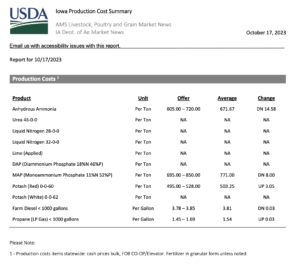Newsweek's Jasmine Laws reported Tuesday that wholesale "egg prices in the U.S. have fallen to $3.45 per dozen, reaching their lowest level in nearly five months, following a period of…
Fertilizer Prices Climb; and Injunction for Largest Proposed Fertilizer Mine in Brazil Overturned
DTN Farm Business Editor Katie Micik Dehlinger reported yesterday that, “The retail prices of all eight major fertilizers climbed higher in the second week of October, with anhydrous, MAP and UAN32 posting the largest gains.
“DTN polls retail fertilizer sellers each week to compile price estimates and considers a price change of 5% or more to be significant.
“Anhydrous prices climbed 16% on average to $804 per ton. MAP and UAN32 each climbed by 7% to $794/ton and $418/ton, respectively.”

Dehlinger explained that, “The prices of the remaining five fertilizers were all higher than last month, but less significantly. DAP cost an average of $711/ton; potash, $506/ton; urea, $575; 10-34-0, $613/ton; and UAN28, $356/ton.”

The DTN article pointed out that, “All fertilizers are now lower by double digits compared to one year ago. 10-34-0 is 19% lower; MAP is 20% less expensive; DAP is down 23%; urea is 30% less costly, both UAN28 and UAN32 are 38% lower, potash is 42% less expensive and anhydrous is 43% cheaper than the year prior.”
Elsewhere, Carol Ryan reported in Monday’s Wall Street Journal that, “The impact of war in Israel on the global economy might be clearer in electricity bills than prices at the pump.
“The old reflex when tensions rise in the Middle East is to worry about oil. But the bigger price moves this week have been in natural-gas markets, which have no plan B when supply is hit.”
Ryan indicated that, “Brent crude has risen 6% since Hamas attacked Israel last Saturday in an assault that killed 1,300 people…meanwhile, Europe’s TTF natural gas benchmark has surged more than 40% this week.”
The Journal article noted that, “Still, natural gas prices may be more volatile than oil because there is no backup supply. The gas market is hobbled by the war in Ukraine, says Michael Stoppard, S&P Global’s global gas strategy lead. ‘We are missing around two million barrels of oil equivalent from the gas market because Russian pipeline flows are locked out. So we are heading into winter with an unusual lack of spare capacity.’
The world will consume around 4,070 billion cubic meters of natural gas this year, and supply is roughly 4,080 bcm. When the market is this finely balanced, even minor glitches can cause big swings. Meaningful new supply isn’t expected for another two to three years.
On Tuesday, Reuters writers Nikunj Ohri and Sarita Chaganti Singh reported that, “State-run firms, Coal India, GAIL India, and Rashtriya Chemicals & Fertilizers, will invest 30.95 billion rupees ($371.90 million) in their fertiliser joint venture in Odisha, two government officials told Reuters.
“GAIL and RCF will put in 17.3 billion rupees, while Coal India will invest 13.64 billion rupees in Talcher Fertilizers to maintain their current stakeholding, adjusted for an increase in project costs, said the sources, who are not authorised to speak to the media.”
“Project cost at Talcher Fertilizers has increased, with the government trying to boost the facility’s output to reduce India’s dependency on imports for nitrogen-based urea fertilisers.
“The infusion is aimed at reviving Talcher and turning it into a coal gasification-based urea fertiliser plant with an annual capacity of 1.27 million tons. India imported 22 million tons of fertilisers worth $15.3 billion last fiscal year,” the Reuters article said.
And Reuters writer Anthony Boadle reported yesterday that, “A federal appeals court has overturned an injunction suspending the license for Canadian firm Brazil Potash Corp to build Latin America’s largest fertilizer mine in the Amazon rainforest.
“The Federal Regional Tribunal 1 ruled on Tuesday that the Amazon state environmental agency IPAAM has the authority to issue the license because there is no officially recognized Indigenous territory in the area of the planned $2.5 billion mine.”
Yesterday’s article stated that, “A delegation of those who support the project met on Wednesday in Brasilia with Mines and Energy Minister Alexandre Silveira, who said the mine was ‘strategic’ for the country.
“‘Brazil is the world’s breadbasket and we cannot be without potash,’ Silveira said in the meeting, according to a ministry statement that said the mine could supply 20% of Brazil’s needs for 23 years.
“The proposed mine in Autazes, 75 miles (120 km) southeast of the Amazonas state capital Manaus, would reduce Brazil’s current reliance on imports for 95% of its potash fertilizer use. The mine is slated to produce up to 2.4 million tonnes a year.”





